September 21, 1963 – Arcola, Saskatchewan
The Fuller Brush Man used to show up at our farm in Saskatchewan every fall. His visits were always conspicuously timed after harvest, when there might be some disposable cash available to spend on brushes and cleaning products.
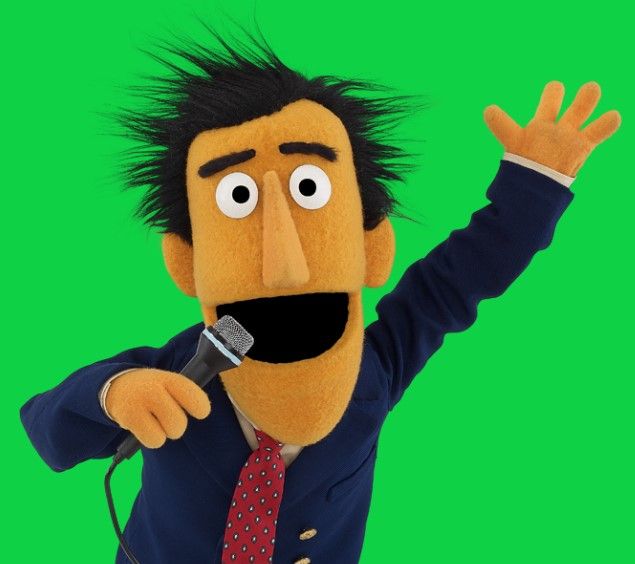
Arcola’s Fuller Brush Man was a charismatic character, he reminded me of Guy Smiley, from the Muppets.
Mom always had time for the brush salesman. Guy was congenial and his products were well-priced, useful items. Mom would invite him into the house for an animated sales-pitch/entertainment session. The Fuller Brush Man usually left with a substantial order.
Fuller Brush salesmen everywhere arrived with free items, for anyone willing to let them in the door.
This letter opener was presented as a gift, but it’s real purpose was as a door-opening device.
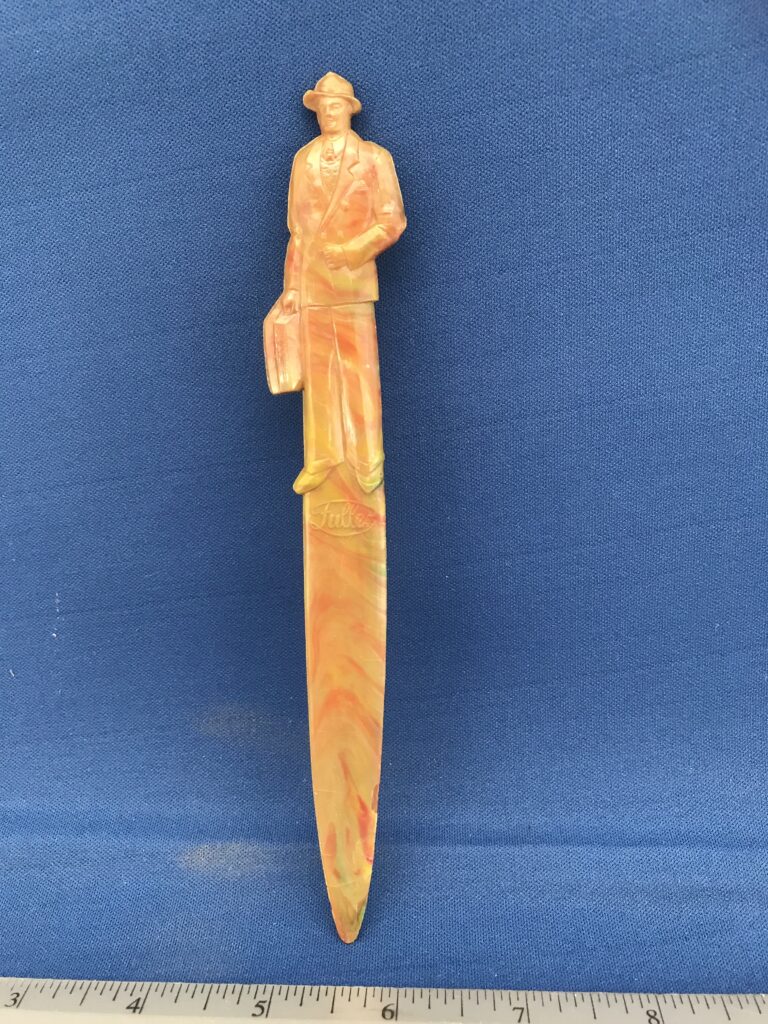
The Fuller Brush Company has been around since 1906, founded by Alfred Carl Fuller, the eleventh of twelve children born to a poor farm family in Nova Scotia.
Fuller moved to Massachusetts as a youth and started selling brushes he built in his kitchen, door-to-door. Fuller brushes quickly gained a reputation for quality. Alfred Fuller stood behind his products, offering a “lifetime guarantee”, for which the company is still famous.
Fuller Brush prospered through two World Wars, the Great Depression, and the boom times of the postwar period. The company stuck with its door-to-door sales model for seventy years.
The sales force was all men until the 1960s, coining the moniker Fuller Brush Man. When women joined the sales force en-masse in the ‘60s and ‘70s, they quickly eclipsed the men in sales volume. The company still exists, but Fuller products are now exclusively sold on-line by Guy (and Gal) Smileys.
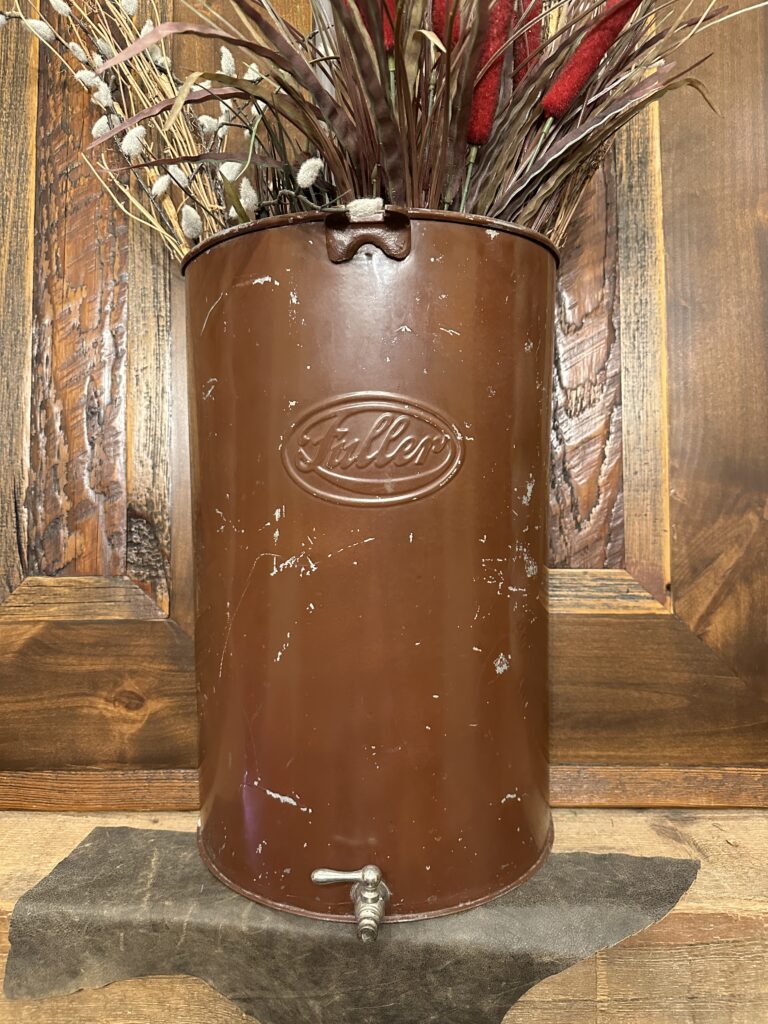
A Fuller outdoor shower reservoir, much like one our family used in the 1960’s.
A galvanized tank like this was mounted on the side of a farm outbuilding and filled with warm water.
As a boy, I rinsed Saskatchewan dust from my hair and body, behind the chicken-house, using a Fuller shower.
Alfred Fuller built his company on principals modern companies would do well to emulate. Employees had to sign a pledge to be “courteous, kind, sincere and helpful”. In the early days, when Fuller was actively selling, he would provide assistance to his customers with their daily chores. In his biography Fuller wrote; “I washed babies with a back brush, swept stairs, cleaned radiators and milk bottles, dusted floors—anything that would prove the worth of what I had to sell,”.
Fuller salesmen excelled at their trade, as witnessed by this headline;
A Fuller Brush Man had to appear in a Texas courthouse for violating a bylaw. He paid a fine of $2.50, pointed to the dirty floors and sold $15 worth of brooms, mops and scrub brushes.
Fuller Brush was so successful it entered popular culture.
Walt Disney created a sketch where Donald Duck sells brushes to everyone he meets.

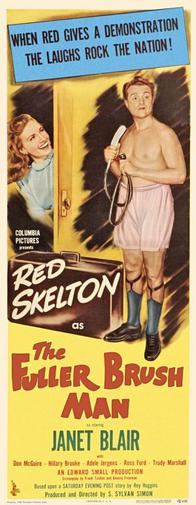
In 1948, Red Skelton starred in a comedy entitled “The Fuller Brush Man”.
I tried to watch a few clips but 1940s humour takes some mental adjustment I can’t quite bridge.
This painting by Alice Neel, entitled “The Fuller Brush Man”, hangs at the Metropolitan Museum of Art in New York.
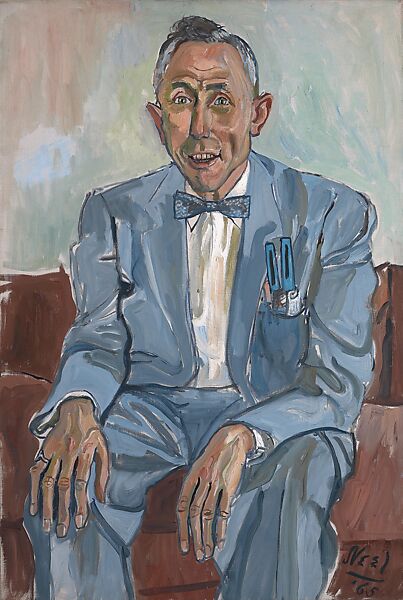
In 1923, Fuller Brush marketing executive Albert Teetsel established a marketing protocol for the Fuller sales force. Any time a salesman was asked the question; “How are you?”, they were to respond “Fine and dandy, how are you?”. Teestel organized a club for top salesmen using the slogan.
The Fuller Brush Company had dignity, something that is in short supply in the 21st century. Wouldn’t it be wonderful if we could all turn back the clock and join …
… The Fine and Dandy Club.
Fuller Brush sparked a genre of “traveling-salesman” jokes. Most humour in this category involves a broken-down car, a remote location, and a farmer’s daughter.
This is one of the few traveling-salesman jokes that isn’t in the “R-rated” category:
A traveling salesman stopped alongside a field on a country road to rest a few minutes. The man had just closed his eyes when a horse came to the fence and began to boast about his exploits.
“Yes sir, I’m a fine horse. I’ve run in twenty-five races and won over $5 million. I keep my trophies in the barn.”
The salesman was amazed. He quickly calculated the value of a talking horse, found the horse’s owner, and offered a handsome sum for the animal.
“Oh, you don’t want that horse,” said the farmer.
“Yes, I do,” said the salesman, “I’ll give you $20,000.”
Surprised at the exceptional offer for an old horse, the farmer agreed without hesitation, “He’s yours.”
While he wrote out his cheque, the salesman asked, “By the way, why wouldn’t I want your talking horse?”
“Because,” said the farmer, “he’s a liar – he hasn’t won a race in his life.”


Terry J
I amend my reply; as it turns out it was the one-armed Watkins man not Fuller Brush. Thanks SKH for the correction.
Terry
Our Fuller Brush salesman came from Weyburn and I recall he had a lower arm missing. I always wondered what happened to him. Mom tried to support him and buy his products when she could afford them. He too was a pleasant, welcome visitor for many rural people.
Russ
That rings a bell. I think we may have had the same guy at the farm a few times.
Gervais Goodman
They do appear when I go the site.
Russ
Hmmmmm?
Gervais Goodman
A fine and dandy story. FYI the pix don’t show up on my phone when I read the column from the email mail out.
Russ
Now, why would that be? I will do some digging.